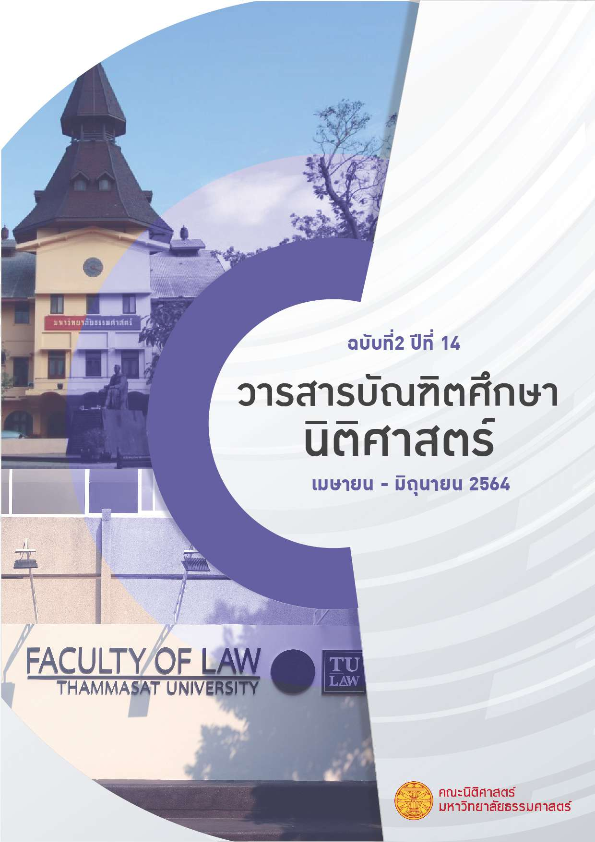DECISIONS OF THE SUPREME COURT INVOLVING UNLAWFUL INVESTIGATIONS
Abstract
This aricle studies The Criminal Procedure Code, Section 120 which states that "Filing any lawsuit by the prosecutor in court without prior investigation of the offense is prohibited". And the Supreme Court interprets that the term "prior investigation of the offense" must also be "a lawful investigation". Therefore, if any case, even if it has been investigated before but such investigation is unlawful, this will result in two legal consequences, namely
In the first case, the Supreme Court considers that the case has not been investigated before. The prosecutor, therefore, has no authority to sue the accused in court under the Criminal Procedure Code, Section 120.
In the second case, the Supreme Court considers that the case has been investigated before, the prosecutor, therefore, has the authority to sue the accused in court under the Criminal Procedure Code, Section 120. However, the court will not listen to only the evidence obtained from an illegal investigation.
From the study of the Supreme Court's consideration regarding unlawful investigations and legal consequences of an unlawful investigation, it does not appear that the Supreme Court has given legal reasons in the decision to determine that what criteria used by the Supreme Court in determining whether an unlawful investigation of any case, has a legal effect in making the investigation void as if such a case had not been investigated before. And the prosecutor, therefore, has no authority to sue. And in any case, where the investigation is unlawful, it does not completely make the investigation void and the prosecutor still has the authority to sue. Such a case, the court will not listen to the evidence obtained from illegal investigations only. If the Supreme Court rules that the investigation is unlawful to the extent that all investigations are all completely void and the prosecutor has no authority to sue, the court thus dismisses the prosecution and release the defendant although such criminal investigation flaws may not affect the content or facts used to prove the offense or innocence of the defendant. If the defendant is the true culprit, this implies that the law cannot prevent and suppress the crime. Or if considering the other aspect, since the Supreme Court considers that the prosecutor has the authority to sue the accused in court even though the investigation is unlawful. But in the case of such unlawful investigation affects the rights in the life, body, mind, or the right to fight a lawsuit of the defendant and later the court examines witnesses and it is believed that the defendant is a true offender and the court sentences the defendant. This is therefore considered to be a violation of human rights in the process of justice to the defendant and will very much result in fairness to the defendant. Such the case is therefore a problem that needs to be studied to find the principles and reasoning used to diagnose the legal results of an unlawful investigation to be more appropriate.
Once the whole criminal procedure code has been studied, the researcher reveals that there are principles behind which are the critical parts of criminal proceedings in accordance with the Criminal Procedure Code as follows:
- Crime Control Model, which focuses on the decisiveness and speed in punishing the offenders so that the state can control, suppress, and prevent crime more efficiently.
- Due Process Model, which is a principle that primarily focuses on protecting the rights and liberties of the people in the judicial process, to prevent people from being violated the rights and freedoms from the abuse of state authority by the officials, such as the assumption that all persons are innocent (presumption of innocence) or principle of no guilt, no penalty if there is no law (nullum crimen, nulla poena sine praevia lege poenali), etc.
The researcher suggests that both the Crime Control Model and the Due Process Model should be used together as a basis for balanced consideration in the investigation of the legal consequences of an unlawful investigation.
Downloads
Published
Issue
Section
License
บทความหรือข้อความคิดเห็นใด ๆ ที่ปรากฏในวารสารบัณฑิตศึกษานิติศาสตร์เป็นความรับผิดชอบของผู้เขียนบทความโดยเฉพาะ คณะนิติศาสตร์ มหาวิทยาลัยธรรมศาสตร์ และกองบรรณาธิการไม่จำเป็นต้องเห็นด้วย



